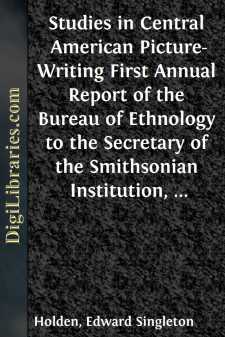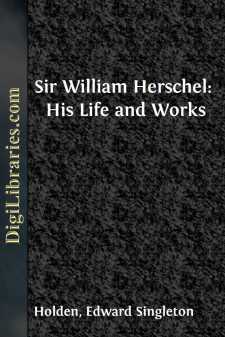Categories
- Antiques & Collectibles 13
- Architecture 36
- Art 48
- Bibles 22
- Biography & Autobiography 815
- Body, Mind & Spirit 144
- Business & Economics 28
- Children's Books 18
- Children's Fiction 14
- Computers 4
- Cooking 94
- Crafts & Hobbies 4
- Drama 346
- Education 58
- Family & Relationships 59
- Fiction 11835
- Games 19
- Gardening 17
- Health & Fitness 34
- History 1378
- House & Home 1
- Humor 147
- Juvenile Fiction 1873
- Juvenile Nonfiction 202
- Language Arts & Disciplines 89
- Law 16
- Literary Collections 686
- Literary Criticism 179
- Mathematics 13
- Medical 41
- Music 40
- Nature 180
- Non-Classifiable 1768
- Performing Arts 7
- Periodicals 1453
- Philosophy 65
- Photography 2
- Poetry 896
- Political Science 203
- Psychology 44
- Reference 154
- Religion 515
- Science 126
- Self-Help 85
- Social Science 83
- Sports & Recreation 34
- Study Aids 3
- Technology & Engineering 60
- Transportation 23
- Travel 463
- True Crime 29
Edward Singleton Holden
Edward Singleton Holden (1846–1914) was an American astronomer and author, best known for his contributions to astronomy and his tenure as the fifth president of the University of California. He served as the director of the Lick Observatory from 1888 to 1897, where he made significant advancements in the study of nebulae. Holden was also a prolific writer, authoring both scientific papers and popular works, including "The Mogul Emperors of Hindustan" and "The Life of Sir William Herschel." His writings helped to make astronomy more accessible to the general public.
Author's Books:
Sort by:
Since 1876 I have been familiar with the works of Mr. John L. Stephens on the antiquities of Yucatan, and from time to time I have read works on kindred subjects with ever increasing interest and curiosity in regard to the meaning of the hieroglyphic inscriptions on the stones and tablets of Copan, Palenque, and other ruins of Central America. In August, 1880, I determined to see how far the principles...
more...
CHAPTER I. EARLY YEARS; 1738-1772. Of the great modern philosophers, that one of whom least is known, is William Herschel. We may appropriate the words which escaped him when the barren region of the sky near the body of Scorpio was passing slowly through the field of his great reflector, during one of his sweeps, to express our own sense of absence of light and knowledge: Hier ist wahrhaftig ein Loch...
more...



